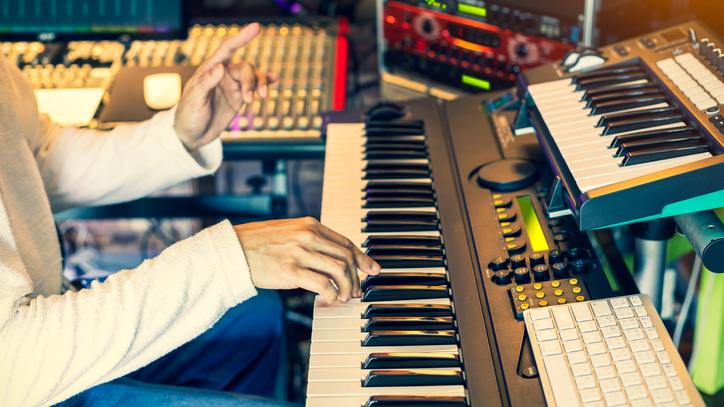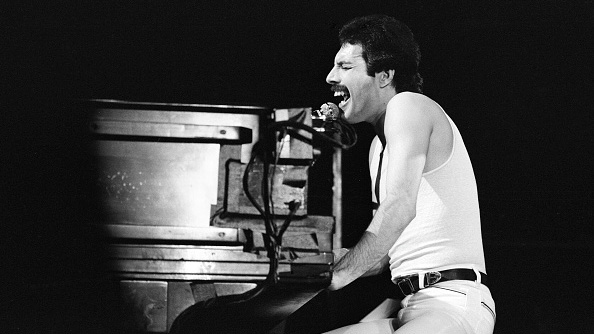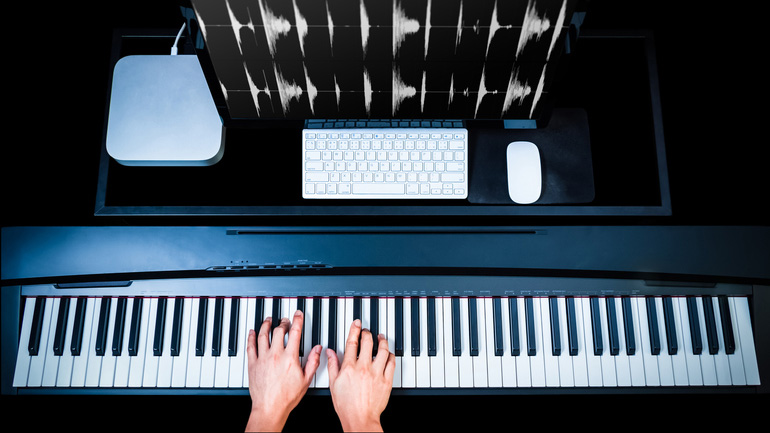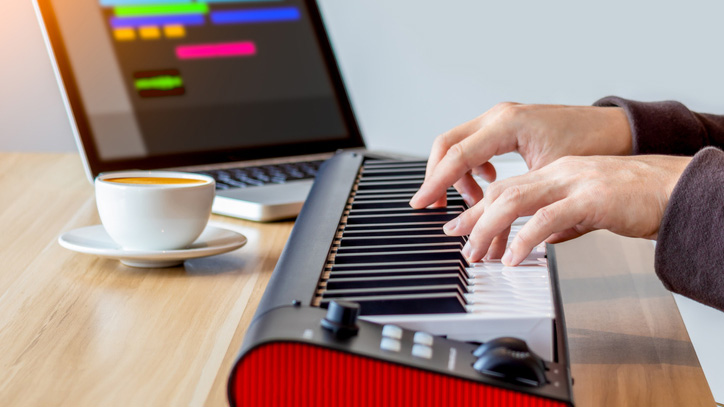Why songwriters should learn the piano
The piano can be a fantastic tool for songwriters to compose and create on – here's why, plus some foolproof songwriting tips

Want all the hottest music and gear news, reviews, deals, features and more, direct to your inbox? Sign up here.
You are now subscribed
Your newsletter sign-up was successful
Songwriting can be something of an elusive pursuit. A lot of the time, if you sit down purposely to write a song, you’ll find yourself staring at a blank page or screen with little or no inspiration. Other times, inspiration can strike when you’re in the cheese aisle at the supermarket. Wherever you happen to find yourself when the muse sticks its head above the parapet, turning the ideas that you hear in your head into a tangible creation that can be shared with the world at large is going to be difficult without some kind of musical tool to help.

Don’t just take our word for how great the piano can be as a songwriting partner – a great many famous artists have relied on the instrument to create some of their biggest hits. Freddie Mercury was a gifted pianist, as evinced by the classically-inspired piano sections of Bohemian Rhapsody. The piano is such a feature of this complex song that it couldn’t really have been written on anything else. Meanwhile, John Legend is a master of crafting sophisticated pop songs on the piano. Ordinary People is a terrific example of a brilliant piano and vocal arrangement – you’d be hard pushed to find a better mid-section anywhere than the one in this exquisite song. Elsewhere, award-winners like Taylor Swift, Billie Eilish and Olivia Rodrigo, none of whom are particularly thought of as piano players, all regularly exploit the piano’s versatility to craft major pop hits.
While many songwriters will instinctively reach for an acoustic guitar to provide the musical framework on which to hang a skeletal melodic idea, one of the most versatile and creative tools to help bring musical ideas to life is the piano.
If you hear a melody in your head, the piano is a quick way to work out the chords that will support it, whereas if the chords appear first, playing them on a piano keyboard will make it much easier to pick out a melody that fits your progression.
Thanks to the piano’s wide span of 88 notes, you can play chords or a bassline with your left hand and pick out an appropriate melody with the right. Because there are many different styles of two-handed playing, the piano represents a very versatile songwriting tool whatever your chosen genre.
The piano has been incredibly popular as a composing tool since it was first invented in the 1720s as an alternative to the keyboard instruments of the day which had thus far not been capable of dynamic performance. The ability of the piano to be played quietly or loudly made an enormous difference to the expressiveness that composers were able to incorporate into their work. Throughout the centuries that followed, the piano thus became the weapon of choice for heavyweights like Chopin, Liszt, Handel, Rachmaninoff and countless other classical household names when it came to producing their seminal works.
The jazz explosion of the ’20s and ’30s saw piano exponents like Scott Joplin and Jelly-Roll Morton use the piano to great success in writing music for the masses, and the subsequent rock’n’roll and pop eras saw the piano take its rightful place as the originator of countless iconic commercial tunes and pop hits.
But what exactly makes the piano such a great songwriting tool in the first place? Let’s examine a few songwriter-friendly aspects of this extraordinary instrument.
Want all the hottest music and gear news, reviews, deals, features and more, direct to your inbox? Sign up here.

1. Harmonic exploration
The piano is a very visual instrument. The contrasting black and white patterns of the keyboard layout enable very strong visual feedback when playing, making it easy to quickly learn which notes are where when picking out melodies and harmonies. If you’re not a particularly skilled musician, the piano is a lot easier to identify and play single notes on than, say, an acoustic guitar, on which even the most basic single-note playing requires you to know how to fret a note properly on one of the six strings, not to mention knowing that the string you’re plucking is the same one as the one your other hand is pushing down on.
2. Rhythm matters
Because it uses a system of hammers hitting strings to produce its sound, the piano can be thought of as a percussive instrument. This means that, when it comes to translating rhythmical ideas from thoughts to sound, the piano makes for a great solution. Need a pounding eighth-note bass? Just get that left hand working while your right hand plays over the top in between the beats. A Stevie Wonder-style two-handed vamp? Bennie And The Jets-style quarter notes? Easy! Because of its percussive nature, rhythm-based song ideas translate easily to the piano keyboard, allowing songwriters to experiment with different rhythms and syncopations, and making it an excellent instrument for establishing a solid rhythmic foundation.
3. Melodic expression
A piano keyboard has 88 keys, giving songwriters a huge range of notes to play with, from extreme bass to almost supersonic top notes. This gives a great amount of scope for experimenting with diverse melodic ideas. Regardless of whether you’re seeking to pin down a catchy hook or a tear-jerking melody, that elusive memorable and emotive combination of notes is definitely in there somewhere! The strong, repeating visual patterns of the piano’s keyboard layout is a fantastic way to help you track it down.
4. Song arrangement and orchestration
Learning the piano helps to equip songwriters with the ability to conceptualise and arrange compositions more easily. The instrument’s versatility when combining elements of rhythm, melody and harmony allows you to experiment with instrumentation, dynamics and structure simultaneously. This can help pave the way to a more well-rounded professional and polished product.
And now for some piano songwriting tips...

1. Keep it simple
Whether you come up with a melody first and pick out notes, or play a chord progression first and come up with the melody later, the piano is a superb tool for bringing your song ideas to life, and often the simplest ideas can be the best. One great example is John Lennon’s Imagine. Much more well-known as a gifted guitarist than a pianist, he was able to piece together one of the most iconic songs of the 20th century using a simple set of diatonic piano chords. Now owned by George Michael’s estate, the Steinway upright piano that Lennon wrote the song on is currently on display in Liverpool’s Strawberry Field exhibition.
2. Ear we go
The ability to play and pick out tunes by ear is an indispensable skill for songwriting on the piano. The instrument’s clear tone and easily discernible pitch makes ear-training easy and facilitates being able to pick out the melodies and chords that make up your favourite songs. Being able to analyse and deconstruct existing songs like this will give you a much deeper understanding of how to construct better songs of your own.
3. Get theory-ous
Studying music theory, even at the most basic level, will deeply enhance your songwriting – if you know how music works, it makes sense that you’ll get much more fulfilling results when trying to create it yourself. The piano makes an excellent platform for grasping the central concepts of music theory effectively, as learning scales, chords, progressions and the like will empower a more confident ability to experiment with a wide range of musical ideas over a variety of genres.
Related buyer's guides
- Best digital pianos: options for every level and budget
- Best digital pianos for beginners: start playing today
- Best acoustic pianos: from budget to premium
- Best piano benches: stool for all budgets
- Best music stands: a songwriting essential
Dave has been making music with computers since 1988 and his engineering, programming and keyboard-playing has featured on recordings by artists including George Michael, Kylie and Gary Barlow. A music technology writer since 2007, he’s Computer Music’s long-serving songwriting and music theory columnist, iCreate magazine’s resident Logic Pro expert and a regular contributor to MusicRadar and Attack Magazine. He also lectures on synthesis at Leeds Conservatoire of Music and is the author of Avid Pro Tools Basics.
